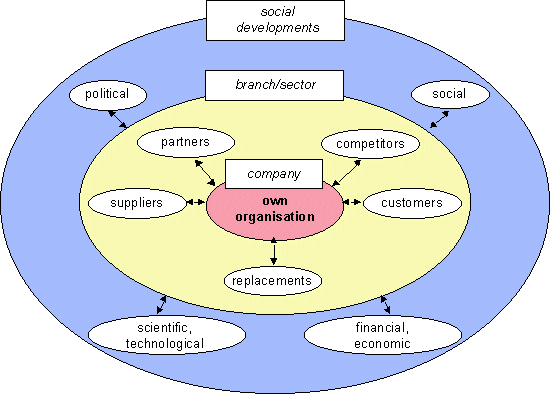
Vision
2.2 Social Trends |
Usually there is a strong interplay between changes in the internal organisation and changes in the environment. Changes in the environment form the field of influence that surrounds a company.

Figure 2.2 A company and its environment. This section gives an impression of the changes in our western society that affect all companies. Great changes are currently taking place, changes of which the scope and pace only increase: political, social, economic, scientific and technological changes. Many of those changes interact. One change can induce another, or changes can enhance or mitigate each other.
Political changes
Currently, great political changes are taking place at a rapid pace. In Eastern Europe, for example, the communist regimes have disappeared. It is still unclear what the consequences of this will be for Western Europe and the European Union (EU), but they will certainly be far-reaching. The Maastricht Treaty has initiated a further development towards one European currency unit, which will have important consequences for government finances. All the member states are now forced to push back their deficits. This is a reason for politicians to reduce the government tasks and cut back on subsidies for civilians and companies. Governments are to work in a more businesslike and customer-oriented way. This leads to government institutions becoming independent or completely privatised organisations.Less economic growth
Between 1945 and 1970, the western economy experienced substantial growth. An important driving force behind this economic growth was industrial production and especially the mass production of consumer goods. Particularly in the western world this development brought great material prosperity. After 1970, the pace of the economic growth has slowed down, in The Netherlands, but also in other countries. It is true that there is still some average growth of the gross national product, but employment figures give cause for worry. The employment rate in the industrial and agricultural sectors has decreased considerably. The service sector at first experienced a strong growth of employment, but now the growth in that sector has stagnated and there is a noticeable trend towards a decreasing employment. The only growth to be seen is in the higher qualified jobs. Much less high qualified work, for instance in the health care sector and home maintenance, is postponed longer and longer, or remains undone. The volume of the work to be done does not decrease. There is a clear need to contract out work. However, the financial resources to give third parties assignments for paid work have gradually become smaller for companies, private individuals and governments, so that a great deal of work is simply not contracted out anymore.Internationalisation of economies
A trend that can be seen in many business sectors is that of internationalisation. Not just multinational companies, but also more and more smaller companies and private individuals are starting to co-operate in world-wide interorganisations. In many cases, IT and telecommunications are catalysts in this development. Telecommunications reduce the influence of distances and make people easier to reach. Developments in telecommunications lead to decreasing costs of world-wide communication between people and of the transmission of messages and documents between computer systems.Individualisation
In the past, people usually belonged to a certain social group, in a much more pronounced way than they do today. Groups could be recognised by certain common characteristics, for example religion, class, social status, clothing or customs. Over the past few years, these traditional religious and social barriers have been in the process of disappearing, and there is an increasing tendency towards individualisation. The traditional, implicit choices of the group are replaced by a wide range of individual choices. This process is reinforced by the increased level of education of people and by their increasing independence. For companies this means that they have to align their products and services to the individual life-styles and wishes of their customers. A common objective of organisational changes is therefore to enhance the flexibility of business processes. This does not only apply to commercial organisations. Non-profit organisations, such as government institutions, are also facing the fact that they have to take the personal wishes of civilians into account more and more.Ageing population
The structure of the population in The Netherlands and in many other Western countries is such, that the population will age considerably in the coming years. Over the past forty years, the average number of children per family has reduced significantly. As a result, less young people enter the labour market, so that the number of the working population becomes smaller. As a result of this, the number of people who are not working will become even larger compared to the number of people who are.Increasing specialisation and complexity
Products are becoming more and more complex. Industrial products, such as aircraft and cars provide good examples of this. In the world of finance, the services offered by banks are becoming more complex. Consider for example options of shares, all kinds of mortgage types and the highly novel ‘derivatives’. More and more specialists have to collaborate to develop and realise products and services, and their knowledge must be more and more extensive.Obsolescence of knowledge
It is getting increasingly difficult for working people to meet the ever increasing demands made of their knowledge and skills, even more so, because the growing complexity of products and services is accompanied by a rapid innovation and adaptation of the corresponding business processes. The knowledge and skills required to perform this type of work properly, are therefore changing more and more rapidly. Many people, both young and old, are unable to keep up with the pace of these changes. Much of what the young learn in school today, will be obsolete soon. More attention is needed for the enhancement of the capacity of young people to adapt and for the re-education of working people.Environment
Over the past twenty years, the grave environmental consequences of industrialisation, intensive cultivation, mass transport and the consumption of energy have become clear. Increasing social and political pressure accompanied by new legislation force companies to use methods that are energy-saving and less harmful to the environment. To be able to meet the requirements, companies have to adapt their products, their production methods and their methods of transport.Faster changing products and market saturation
The past few years have seen an acceleration of technological innovations and the marketing of improved and new products. One of the reasons for this was the need for companies to meet the individual wishes of customers and to provide an answer to the increased competition brought about by the internationalisation of trade. Companies have to market new products and services at an increasingly high pace. The life cycles of products such as cars and consumer electronics become shorter and shorter. In the world of finance, too, companies frequently add new types of services to their portfolios, for instance new specific mortgage types. The increasing pace at which governments issue new tax measures, is also of influence.Pace of the changes
Many people are under the impression that the pace of change is increasing. It seems as if we have less and less time. Since the discovery of the mathematically founded chaos theory, we know that this increasing turbulence of change signifies a period of transition to a new social order. Such a transition is based on developments that undermine the established order, and therefore our socio-economic stability. Some of the developments described above are undoubtedly contributing to this.
The socio-political consensus there was in the Western world between 1945 and 1970, about the direction in which economy and society should develop, has vanished over the past few years. It seems that the limits of material prosperity have been reached. The direction the developments will take from here is still unclear. On the one hand, governments and companies are still taking steps to preserve the current socio-economic order as much as they can. These steps are becoming less and less effective, however, so that officials soon feel the need to take new steps. On the other hand, we already see small-scale changes that form the beginning of a new social order. There is a typical transition towards a new form of collectivism. New forms of collaboration between individual people and autonomous organisations are emerging, companies that no longer compete with each other, but form strategic alliances to be able to come with new products. People with specialist knowledge start to work in teams towards a common goal. IT and telecommunications are catalysts in this process of change.